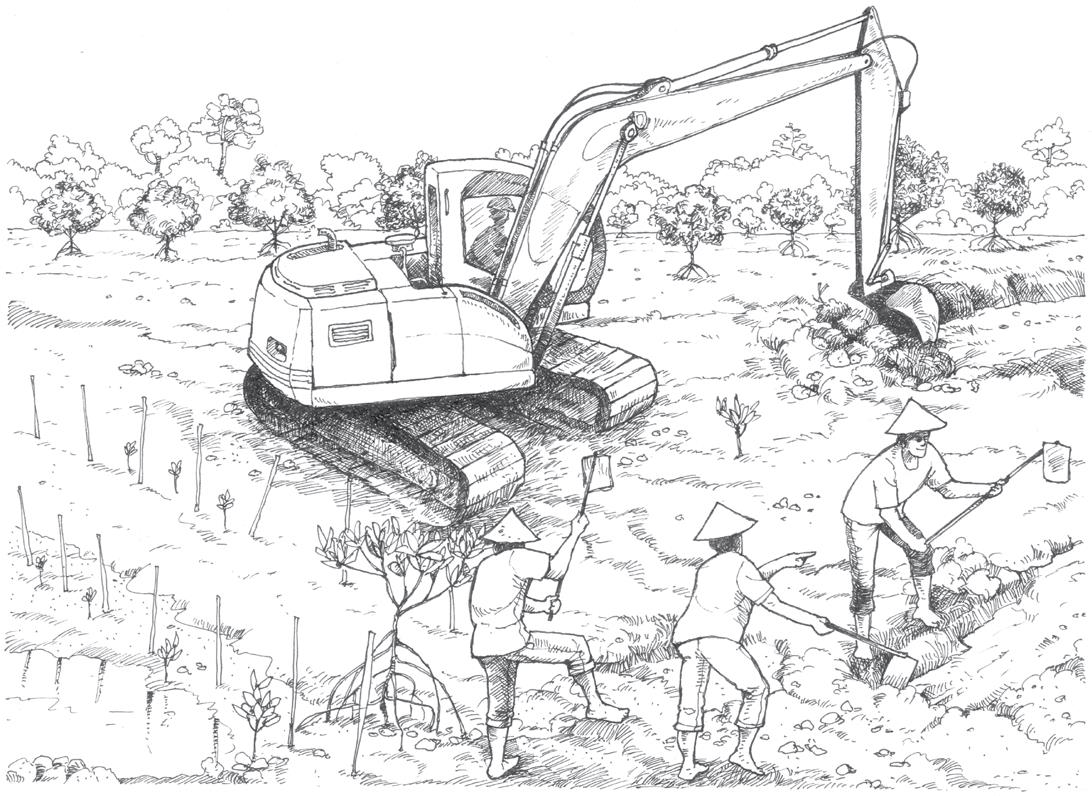
Progressing At the Anawilundawa Wetland Restoration Site
More about our flagship project being undertaken jointly with the Department of Wildlife Conservation (DWC), the Wayamba University of Sri Lanka and selected private sector partners in the Anawilundawa Ramsar wetland sanctuary…
Phases of the project
Data collection on-site is as follows,
- Site assessment for the flora – completed
- Site assessment for fauna – Mammals, birds, fish, reptiles, amphibians, gastropods, crabs, and shrimps – ongoing
- Site assessment for threats – ongoing
- Site assessment for soil and water – completed
Bird watching
Floral survey
Water sample checking – pH, conductivity, temperature
Soil samples collecting – for soil carbon tests, pH
- Preparation of the grounds – completed (plot 07)
- Plots adjacent to the Dutch canal (to the west of the central canal) will be restored with mangroves and salt marsh species depending on the ability of the plants to colonize.
- DWC will create two constructed wetlands in the restoration area to provide habitats for fauna and other organisms.
- Plots to the west will be irrigated by means of individual canals to ensure the tidal flow of water from the Dutch Canal.
- Each partner responsible for the plots are expected to bear the cost of such hydrological interventions (construction of canals).
- The location of each plot’s canal will be decided on a case-by-case basis considering the topography (land elevation), existing flora, and most environmentally beneficial approach.
- Within each plot, depending on the contours within the plot, inner channels will be constructed. The width, depth, and design will be on a case-by-case basis.
Design – plot 07
Before
After
Remaining tasks
- Nursery management.
Nursery maintenance should be carried out with the support of the local community as a means of livelihood enhancement for them. Quotations should be called by DWC and the cost borne equally by all partners. The list of species is that should be raised at the nursery. Data sheets to be maintained at the nursery for growth monitoring and survival.
The same data sheet should be used for each plot to monitor the growth of approximately 100 tagged plants.
Nursery plants should be transferred to the definitive plots between 3-4 months of bagging.
Rhizophora mucronata dominates the Dutch Canal bank and areas where tidal water influx is significantly higher. Hence, R. mucronata will be used only in areas where such conditions are available. Also, direct planting is performed with mature hypocotyls at the right time after rain when the plots are acclimatised, the survival and growth rates are higher.
Other species – Avicennia marina, Avicennia officinalis, Bruguiera cylindrical, Aegicerus corniculatum, Nypa fruticans, Xylocarpus granatum, Heritiera littoralis, Lumnitzera racemose, Excoecaria agallocha
Specie – Excoecaria agallocha
Specie – Avicennia officinalis
- Gap filling.
Gap filling should be done only after removing the dead plant and soil associated with it. Gap filling should be done using the plants raised in nurseries. Also, mangrove associates should be used in gap filling.
- Maintenance of hydrology status.
Weekly observations of constructed channels should be done and log books should be maintained. Especially after heavy rains and floods, maintenance should be done. This avoids major maintenance.
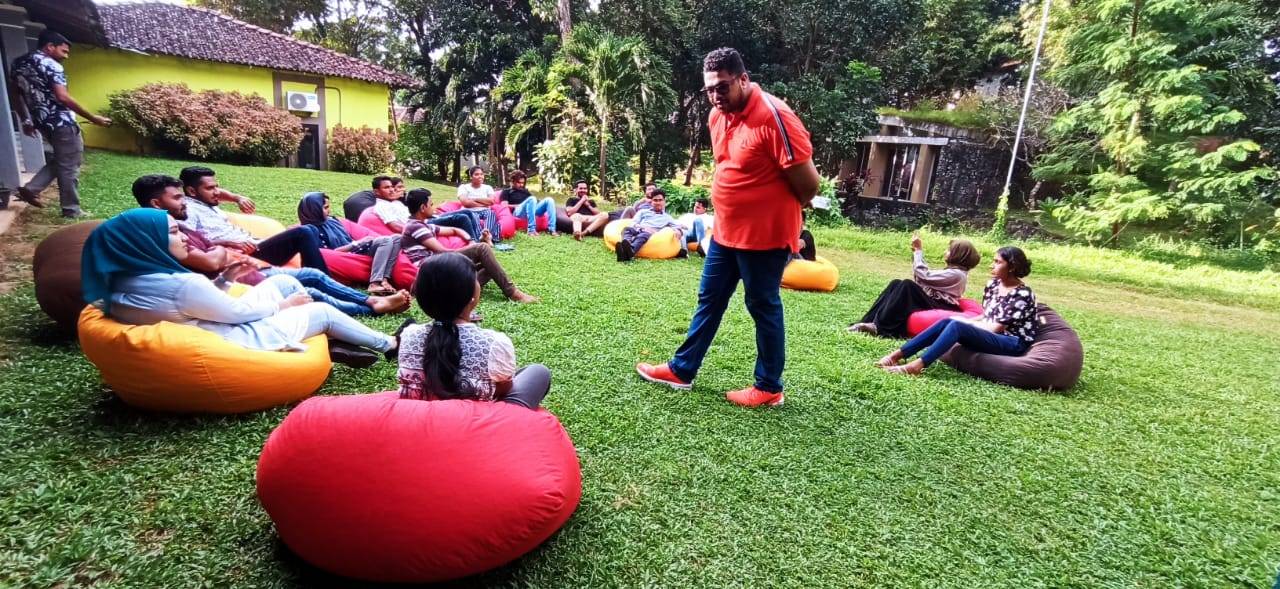
Working With Budding Youth Action Activists
24 candidates from the Colombo district were selected and trained to be leaders in climate action under the auspices of the Youth Leadership for Climate Action (YLCA) Project, funded by the British Council and implemented by Biodiversity Sri Lanka with technical support from Curve Up. The training program was conducted over a period of nine days, in all three languages. Split into 3 segments, the 1st two segments were residential training programs whilst the 3rd segment was a non-residential training program. Both the first and second training segments were conducted successfully, along with activities for skills development, climate awareness, and entertainment for the participants. The sessions were focused on the YLCA Learning Journey (YLCA River Journey), which is conducted in 5 phases: Me, Me, and You, We Together, Social Action, and Locally engaged-globally connected.
Here is a cross-section of participant feedback:
- “Compared to previous workshops we’ve attended, YLCA made each one of us gets involved in all the activities, keeping us away from boredom.” – Shaheer Ahamed
- “YLCA has made me look at the environment around me with a different perception, for example, I see a tree as something which helps reduce pollution in the air.” – Fathima Nawreen
- “Thank you so much for the excellent training. We were quite pleased with how much fun you made it for us! We gained a lot of knowledge. We were strongly urged to participate by the excellent facilitators.” -Kithiyon Yoganathan
- “The YLCA training program helped me a lot to think differently in terms of biodiversity and climate change.” – Junali Shaini
- “The program has instilled good values in me, to see the unseen side of climate change”. – Jathujan Mahendran
After a comprehensive training session on project development, along with expanded virtual discussions on the project proposals, followed by ideation and prototyping workshops, candidates were inspired to raise 8 project ideas (Individual & group), focused on climate change and biodiversity.
Here are some of the Community Intervention Projects:
- Spread awareness on Biodegradable diapers and the long-term goal to introduce an appropriate biodegradable diaper product to the market.
- Upcycling the fabric waste to reduce the open burning of fabric waste and produce a new product.
- Tree planting program with the involvement of the children living under probation to enhance the air quality in the area while reducing air pollution and fostering a positive mindset in the children who are a part of the program.
- Make a video documentary to spreading awareness of environmental harm from lunch sheets.
- Eco-friendly play items for kids are designed and produced using wood waste materials. By utilizing eco-friendly toys instead of plastic ones, this encourages improving children’s attitudes while reducing plastic usage and waste.
- Spread awareness on the value of the wetlands, based on Bellanwila- Aththidiya Sanctuary. The long-term objective is to organize youth-focused wetland activist groups in the Aththidiya Sanctuary area.
- Innovative ways to manage garbage in schools through awareness, introducing waste management system, 3R, school gardening, etc
- Introduce a proper solution for food waste management by converting food waste into compost using a machine called a food waste accelerator.
Candidates will begin their three-month community intervention initiatives after the third segment of the training. While the intervention projects are in progress, a networking program for the candidates will be held on the first week of February 2023, with the involvement of stakeholders from the public and private sectors. At this event, the project teams will present their concepts, and the best project concept, best presenter, etc. will be chosen. Candidates from Kandy and Gampaha will also take part.
Keep in touch with us for more updates on this fascinating program.
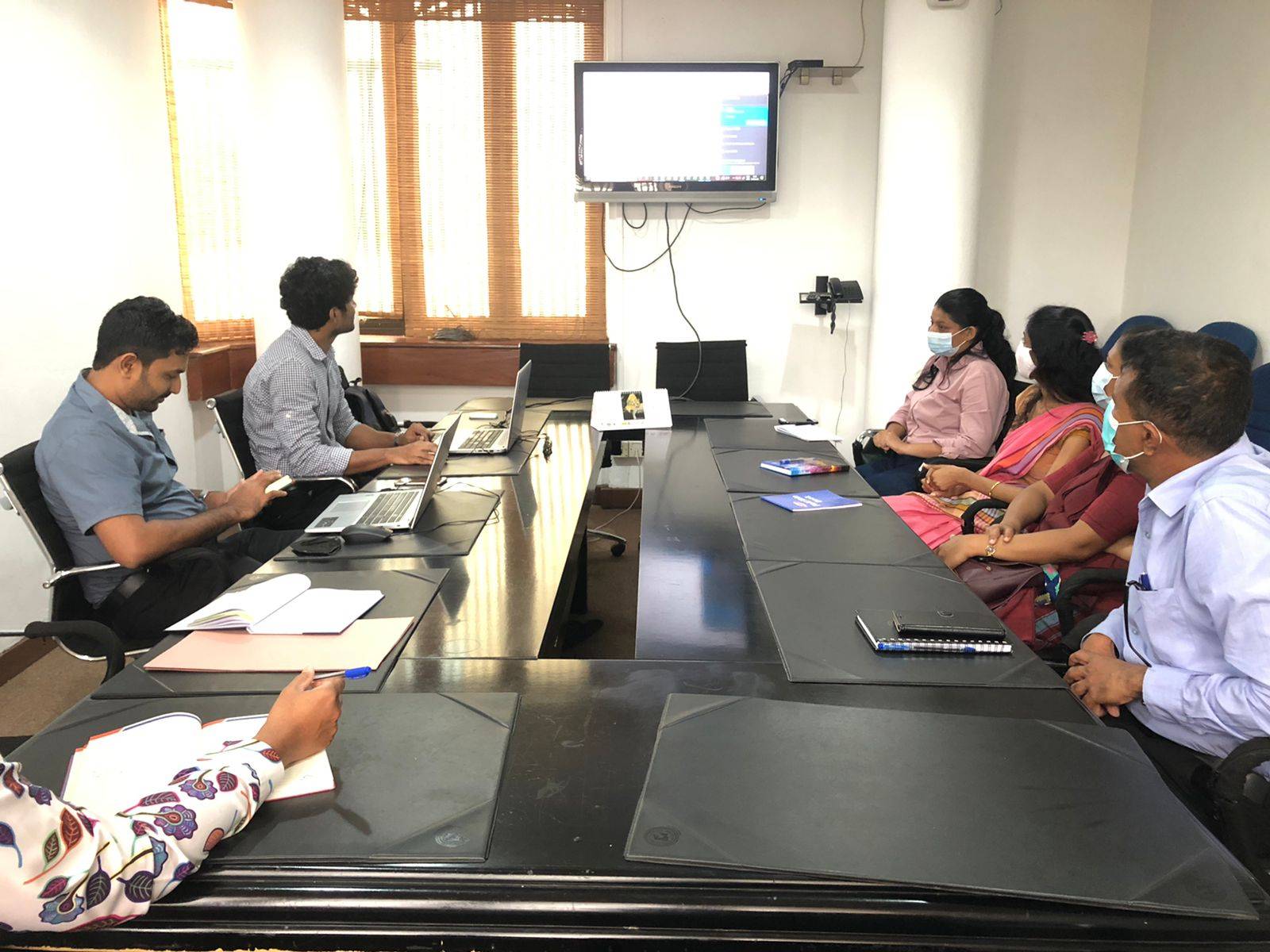
The On-Line EPR Portal To Be Housed and Managed At CEA
With funding from the Clean Cities Blue Oceans (CCBO) initiative of the United States Agency for International Development (USAID), the Ceylon Chamber of Commerce (CCC) and Biodiversity Sri Lanka (BSL) developed an Online Plastic Waste Reporting Portal for Extended Producer Responsibility (EPR) Obligatory Companies. On June 16, 2022, the Project officially inaugurated the EPR system for the environmentally responsible management of plastic waste. To access the online portal, visit www.epr.lk. The platform was developed by Virtusa Pvt Ltd., on which the private sector will commence reporting on waste collection and recycling.
The initiative aims to increase plastic waste collection and recycling to minimize plastic pollution at the national level. The Online reporting portal has been endorsed by the Ministry of Environment (MoE) and the Central Environmental Authority (CEA) and welcomed by the private sector.
As suggested by PET and HIPS Consortia Members, the CCC and BSL are now in the process of handing over management and monitoring of the Online Reporting System to the CEA. With this transfer, EPR-Obligatory firms are expected to use the system to submit information on their plastic waste usage and collect-back accomplishments to CEA. In this regard, the Project had several meetings with the Senior Management Team of CEA. Following these negotiations, CEA confirmed that they are prepared to manage the online reporting system’s backend. Furthermore, they reaffirmed their utmost collaboration and support to the Project. In order to formalize the engagement an MoU between the CCC and the CEA will cement the relationship between the parties.
Launch of the online reporting system
The Project conducted a training program for selected employees of CEA and provided them with the necessary equipment to handle the online portal. The CEA will soon convene a meeting with the PET and HIPS Consortia Members at which the brand owners would be informed that CEA has taken over the responsibility of managing the Online Reporting System. They will be requested to report on manufacturing and collection figures from January 2022 onwards into the Portal. It has been agreed that a three-month pilot run of the system would help uncover problems and the adjustments that may be required to be made.
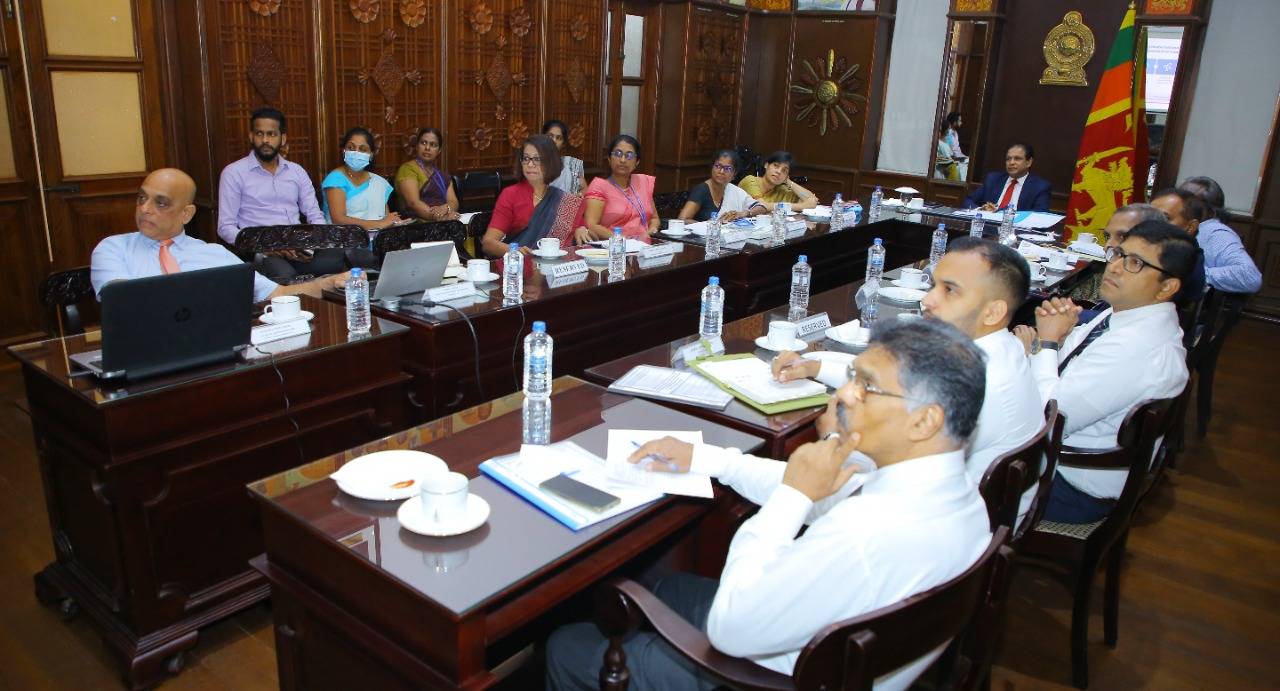
BSL Engages In Efforts At Streamlining Contribution Of The Private Sector Towards Achieving The Sustainable Development Goals
BSL attended a discussion, chaired by Mr. Anura Dissanayake, Secretary to the Prime Minister along with many other distinguished guests, which was held recently, on the contributions of the Private Sector, Non-Governmental Organizations, and Civil Organizations towards achieving Sustainable Development Goals (SDG) with a special focus on Biodiversity Conservation and Climate Change Mitigation.
Mr. Anura Dissanayake, Secretary to the Prime Minister
Sri Lanka has not been able to accurately report on SDGs and biodiversity-related targets and achievements. Therefore, corrective action is needed to rectify the situation by establishing a mechanism for reporting on more holistic stakeholder contributions including Government, Corporate Sector, non–Governmental Sector, and Community-based Organizations accurately.
BSL, with a membership of approximately ninety (90) private sector corporate bodies, is using an integrated common Data Portal to upload details of member investments and contributions to biodiversity enhancement and all related activities. Thereby, a clear understanding of the contributions made towards biodiversity protection and climate change mitigation by its membership is centralized. It was noted that if the requirements of the Government can be aligned with the established reporting criteria such as ‘Global Reporting Initiative (GRI)’ criteria, it will be much easier to absorb all relevant national data from Private Sector initiatives. The ‘Data Gap’ can also be addressed by maintaining a more comprehensive data system. UNDP assistance could be possible to access to address this data gap.
Mrs. Shiranee Yasaratne – Advisor, Biodiversity Sri Lanka
SLASSCOM is actively engaged in promoting a number of biodiversity and SDG-related initiatives including e-waste management processes, the use of renewable energy, the creation of methods of working from home by reducing transportation which ultimately contributes to energy conservation, and the implementation of flexible working hours, etc. these measures ultimately promote sustainable development practices in their member institutions in the IT sector. It was also noted that a proper and accurate reporting system should be followed as a nation so that external parties can understand the positive steps that Sri Lanka has adopted so far toward achieving the SDGs. The process should be promoted through digital media platforms to attract investors to Sri Lanka which could result in additional Foreign Direct Investments (FDI’s).
Virtusa (Pvt) Ltd presented the “Environmental Social Governance (ESG)” reporting system and the “United Nations Global Compact” Principles at this discussion. The steps that Virtusa has adopted in their reporting process while following GRI standards were described. Accordingly, Virtusa (Pvt) Ltd has effectively contributed toward 12 out of the 17 SDGs through these practices. Virtusa is also following Carbon Footprint Reduction Programs, the Zero Single-use Plastic System, the use of Renewable Energy, the motivation of employees towards SDG, and the Policy of avoiding Bribery and Corruption, etc. It was also stated that as a nation, both Public and the Private Sector should take necessary action to implement clear SDG implementation methods at least now, as the country is gradually trying to revive from the ongoing financial crisis. It was suggested that imposing new regulations to ensure that every company should invest a certain percentage (3%) of its net profit in Corporate Social Responsibility (CSR) initiatives would promote the achievement of SDG targets.
The biodiversity division of the Ministry of Environment is in the process of developing a “Bio Diversity Expenditure Tracking Tool” and it includes the SDGs national target as well as the contribution of the Private Sector. Alliance Finance Company PLC, as a socially responsible corporate body, is using the “Sustainability Standards and Certification Initiatives (SSCI)” platform to integrate sustainability into every aspect of their business with positive and measurable outcomes. He further mentioned that the M/s Alliance Finance is approximately covering 76% of the 17 SDGs by performing actively in achieving financial sustainability by aligning the SDGs with its corporate Vision and Mission. It was suggested that standards are much more essential than guidelines in achieving the SDGs and recommended that those standards be based on social dimensions with a primary focus on the Environment and Society. The private sector should be encouraged to adapt to the proposed standards by the government so that tendency of Private Sector institutions to adapt to the relevant standards will increase.
The Director General – Sustainable Development Council suggested that the composition of the Steering Committee appointed to engage the Private Sector’s contribution to SDGs should be expanded as necessary to incorporate the above suggestions
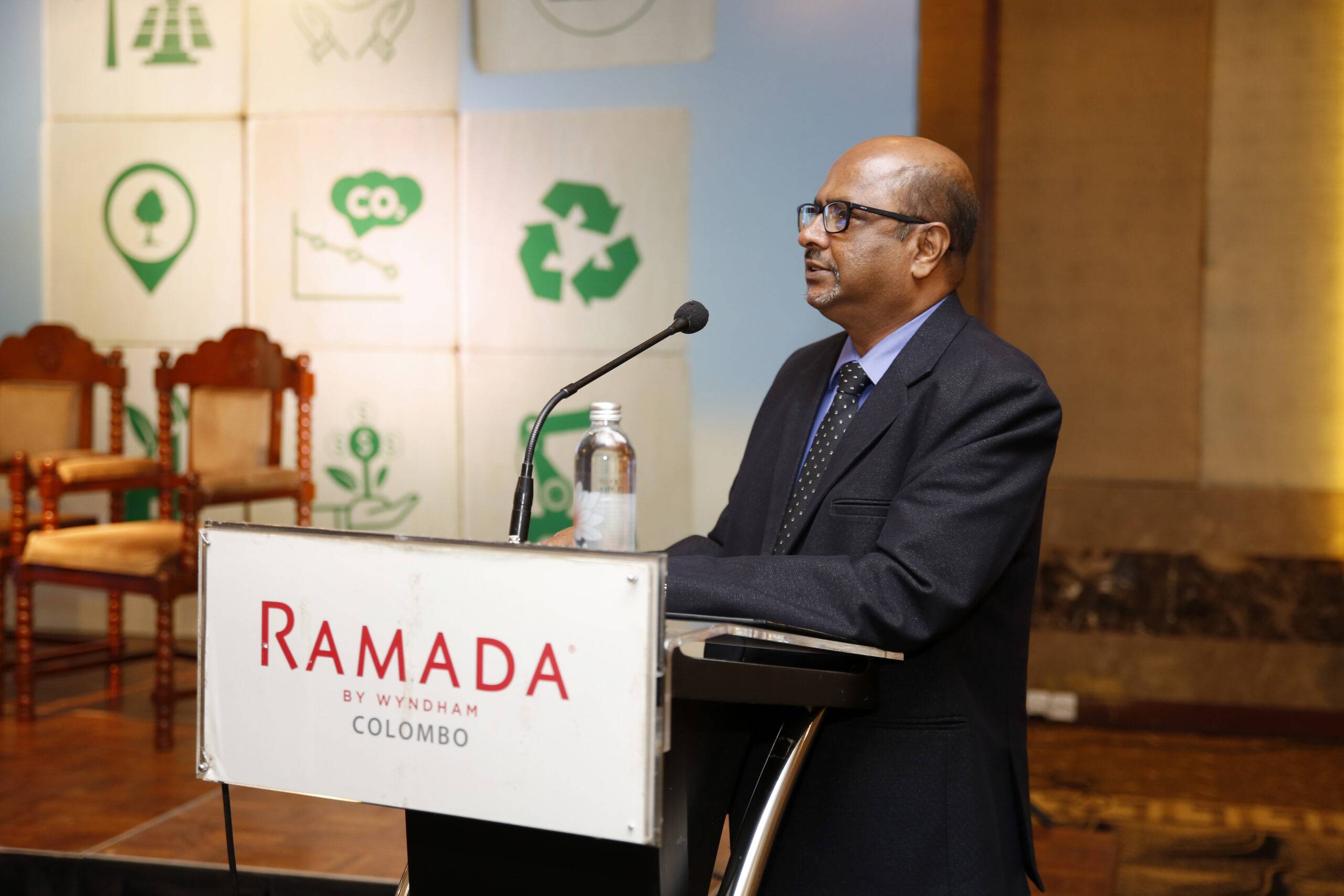
Fresh Thinking, New Solutions: Ways To Fight Climate Change – Featuring The Keynote Presentation At Bsl’s Ceo Forum
Our CEO Forum was held on 3rd November 2022 at Ramada Colombo in the aftermath of its 7th AGM. Representatives from over 90 renowned private sector companies participated in the event. The keynote speech on the topic ‘Fresh Thinking, New Solutions: Ways to Fight Climate Change, was delivered by Dr. Ranjith Punyawardena, Chairman, National Steering Committee on Climate Change Adaptation, Ministry of Environment, Sri Lanka & Former Principal Scientist (Argo-Climatology)- Department of Agriculture, Sri Lanka.
Dr. Punyawardena commenced his speech on an interesting note, indicating the disappearance of glaciers on Mount Kilimanjaro from 1912, 1970, 2000, and 2006, as pictured by the Swedish Chemist Svante Arrhenius. He also explained how the greenhouse effect, global warming & climate change has had a drastic adverse impact on temperatures, also mentioning how the last 7 years are ranked as the top 7 hottest. He then defined the terms ‘Climate Variability’ & ‘Climate Change’ by indicating adaptation or resilience building for natural climate variability carried out through the Village Tank Cascade System in the Dry and Intermediate Zones of Sri Lanka, harnessing the potential of reliable climatic regime and terrain through the Village Anicut Systems in the Wet and Intermediate Zones of Sri Lanka.
Dr. Punyawardena next highlighted the salient features of climate change in Sri Lanka, which is the slow and continuous rise of ambient temperature, especially the nighttime minimum temperature and heat stress. He also highlighted the future climate of Sri Lanka according to the AR5 RCP 4.5 Scenario (mean across all 3 climatic zones) and trends of Summer Monsoon (SWM) and Winter Monsoon (NEM), following which he explained the options available for combatting the climate crisis – adaptation, mitigation or no actions.
The world is warming faster than at any point in recorded history. Several important events have occurred during the past years, such as the temperature rising by 0.08oC per decade since 1880, and the rate of warming is increased by more than twice (0.18oC per decade) since 1981. 2021 has been the sixth-warmest year on record. Thereby, Dr. Punyawardena highlighted the need to reduce global warming through new solutions or Nationally Determined Contributions (NDCs), which is a climate action plan of a country to cut emissions and adapt to climate impacts in order to ensure a safer future below the 1.5oC threshold. He then explained in order to ensure a safer future below the 1.5oC threshold, it requires the world to cut 30 Gg GHG emissions annually by 2030. Therefore, the Paris Agreement/UNEP has identified the 6-sector solution, which can reduce 29-32 Gt CO2e and limit temperature rise to 1.5oC; Energy – 8.2 Gt, Industry – 5.4 Gt, Agriculture, Food & Waste – 6.7 Gt, Nature-based climate solutions – 5.9 Gt, Transport – 4.7 Gt and Building & Cities – 5.9 Gt. Finally, he briefed on Sri Lanka’s commitment to NDCs, to reduce GHG emissions by 14.5% by 2030, including an unconditional reduction of 4%, establishing 2030 targets to achieve 70% renewable energy in electricity generation while no further increase in the capacity of its coal power plants and also Sri Lanka expecting to achieve Carbon Neutrality by 2060 while Carbon Neutrality in electricity generation by 2050. He also explained the Mitigation NDCs and Adaptation NDCs of Sri Lanka.
As an ending note, Dr. Punyawardena mentioned some points for serious consideration such as the political commitment to climate actions, and the availability of an effective and inclusive engagement process in place to ensure that society accepts and adopts the proposed NDCs. He opined, are we ready with a strong supporting and coordination mechanism to ensure effectiveness and efficiency of NDC implementation, while avoiding overlaps during the process, are there any conflicting issues or synergies between post- Covid 19 recovery plans and Climate Actions, and trends of Sri Lanka’s GHG Emissions by Sector (Energy, Waste, Land-Use Change and Forestry, Agriculture & Industrial Processes) and Percent of Total Emissions for reflection by the participants.
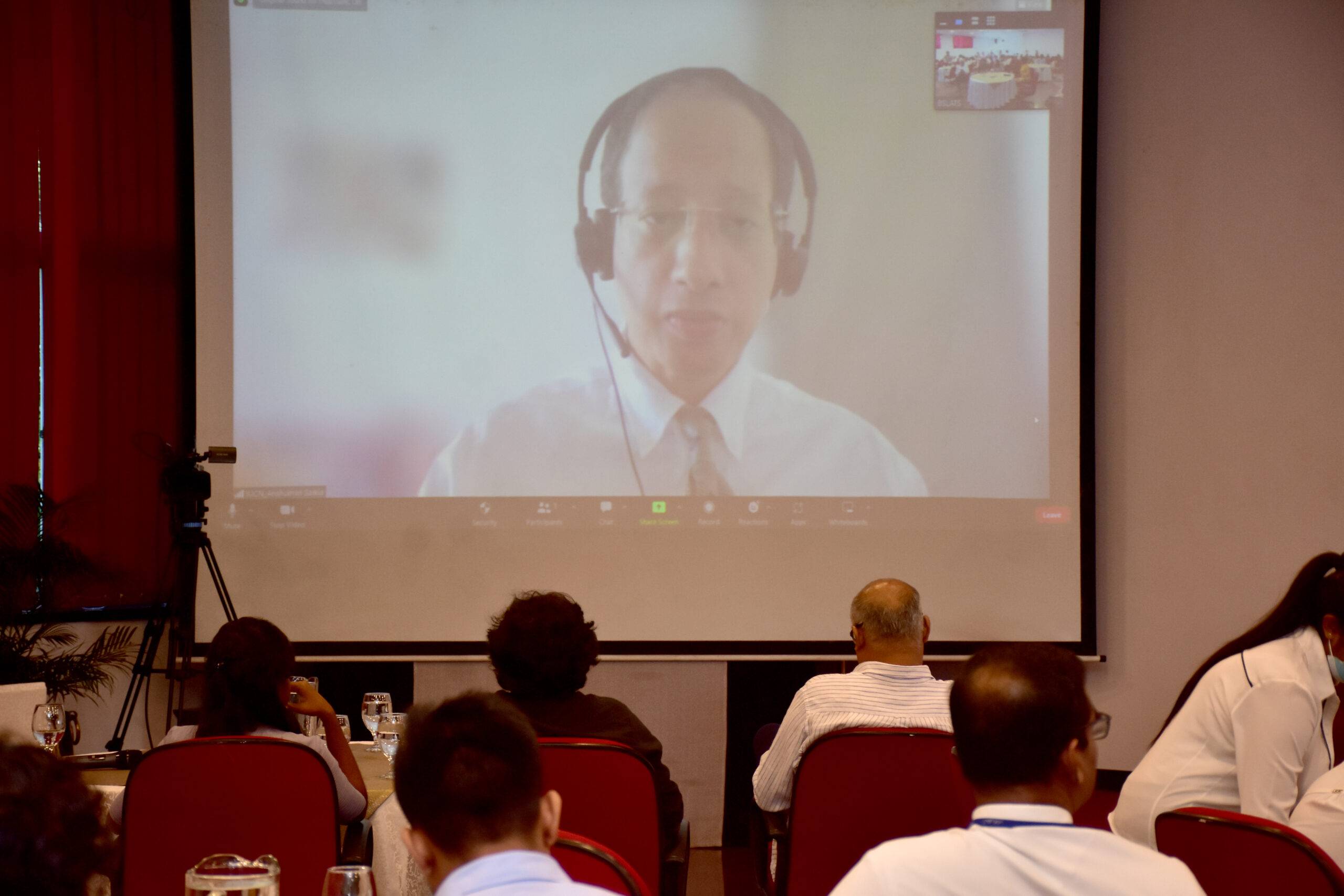
Annual Technical Session 2: Aligning business action with Post-2020 Global Biodiversity Framework & 2030 Action Targets
Over the last two years, we have seen significant engagement from 1,100 companies that are advocating for a nature-positive world, and hundreds of leading companies making commitments and applying available tools and data to help implement and deliver the relevant targets included in the Post-2020 Global Biodiversity Framework (GBF). There are more targeted resources on the way to support business implementation, such as the Science Based Targets Network (SBTN) and the Taskforce on Nature-related Financial Disclosures (TNFD).
The Convention on Biological Diversity’s Conference of Parties 15 (COP15) is now set to take place at the headquarters of the Secretariat of the Convention on Biological Diversity (SCBD) in Montreal, Canada from 5 to 17 December 2022. Member states will adopt the Post-2020 (GBF) at COP 15, which will hopefully provide a clear direction and strong signal on the need to halt and reverse nature loss by 2030. Based on Target 15 – Role of business, there has been significant momentum in favor of mandatory requirements for businesses and financial institutions to assess and disclose their impacts and dependencies on nature. The need for businesses and financial institutions to reduce their negative impacts on nature by at least half and increase positive impacts has also been supported by many countries during the negotiations but will need further discussion in Montreal.
The session engaged with experts to discuss road maps that break down what nature-positive means for a business to help companies understand what nature-positive means for their sector and break down key actions businesses need to consider to address nature loss. These Roadmaps include guidance on assessing dependencies, measuring impacts, and tracking efforts to halt and reverse nature loss across the value chain.
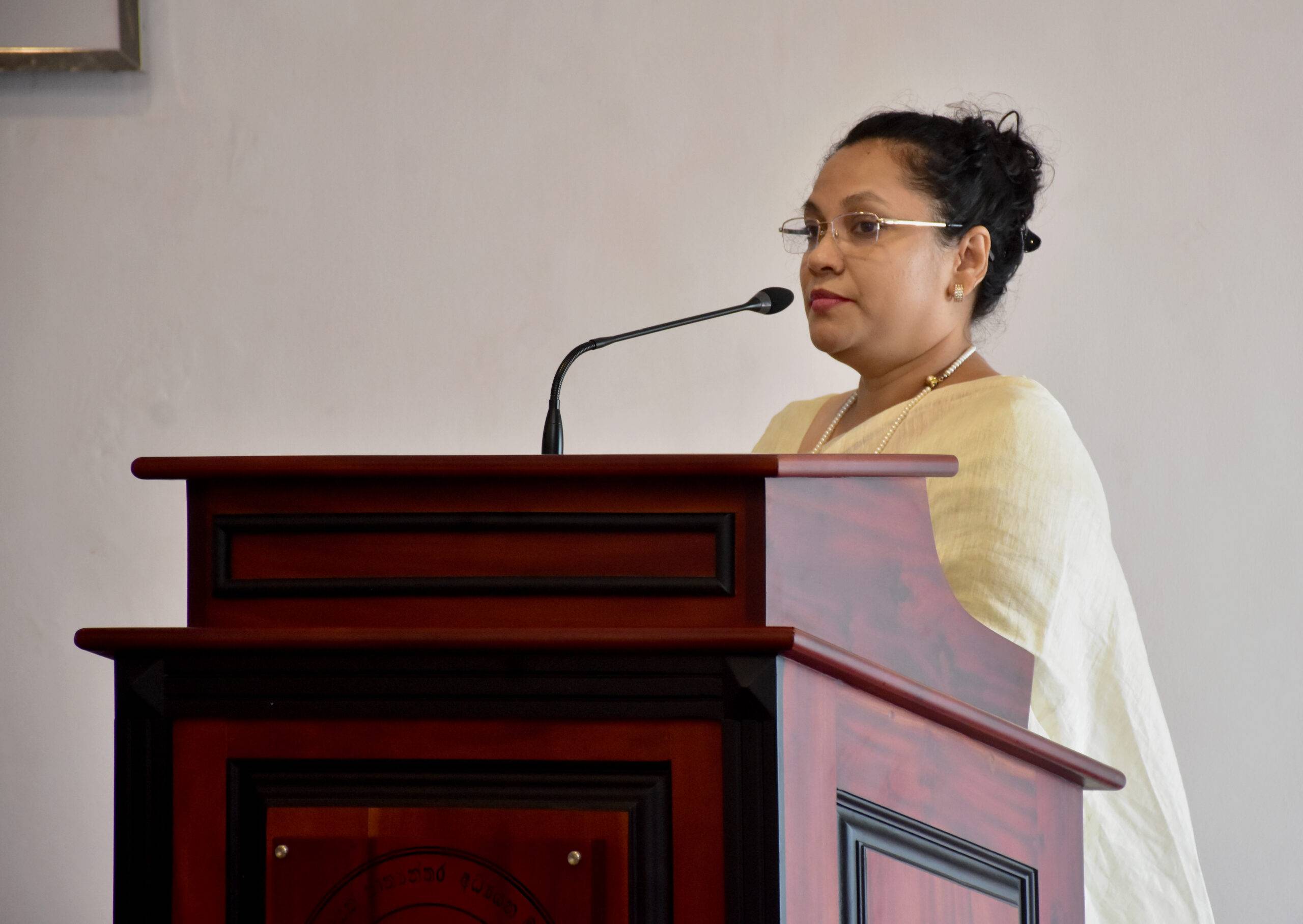
BSL Technical Session 1: Innovative Financing Mechanisms For SDG Implementation In Sri Lanka
The keynote speech on the topic ‘Inclusive Transformation towards a sustainably Developed Nation for All’, was delivered by Ms. Chamindry Saparamadu, Director General/CEO, Sustainable Development Council of Sri Lanka.
In her speech, Ms. Saparamadu discussed the current position of Sri Lanka, in terms of the progress of the Sustainable Development Goals (SDGs) implementation, within the past 4 years (from 2019 to 2022) and the policies aligned with SDGs. The flagship strategies, programs, and achievements aligned with SDG implementation were highlighted, emphasizing the rise in fisheries exports during the past 10 years, taken as an example of diversifying the economy. The SME Policy Framework Matrix was brought forward, by indicating the Policy Vision, Policy Mission, and Policy Objective. Details on Knowledge Economy were explained by elaborating on the decade of Skills Development: 2021 – 2030. The Blue green economy was highlighted as a vision for a low Carbon Future and revolutionizing waste management by the Nitrogen Waste Management Policy on Sustainable Consumption and Production. The next point discussed was the Technology driven Transformation, indicating the improved position of Sri Lanka’s ranking according to the E-Government Development Index and the roadmap for Government Digitalization taken into consideration.
Ms. Saparamadu also discussed Social Inclusivity, indicating the emergency cash transfer measures introduced by the GoSL in response to the impacts of COVID-19 and the Maternal Mortality, Neo-Natal Mortality, and Under-five Mortality Ratios. Strengthened Law Enforcement and Rights Protection were emphasized thereafter. The challenges to be faced, such as twin deficit, data gaps for targeted and evidence-based planning, and policy incoherence and institutional fragmentation were discussed hereto.
The best way to move forward was explained by Ms. Saparamadu, as addressing systematic and structural issues that impede SDG progress, Mobilizing Financing for SDGs, such as debt restructuring, sustainable and innovative financing, etc. The keynote speech ended with Key Initiatives for Mobilizing Resources for a Sustained Transformation, recommending publications from the Central Bank of Sri Lanka, such as ‘Roadmap for Sustainable Finance in Sri Lanka’ and ‘Sri Lanka Green Finance Taxonomy’.
The Sri Lanka SDG Investor map was introduced as a final note, by indicating its development process and the IOAs mapped to priority sectors such as Renewable Energy, Food and Beverages, Infrastructure, Healthcare, and Consumer Goods.
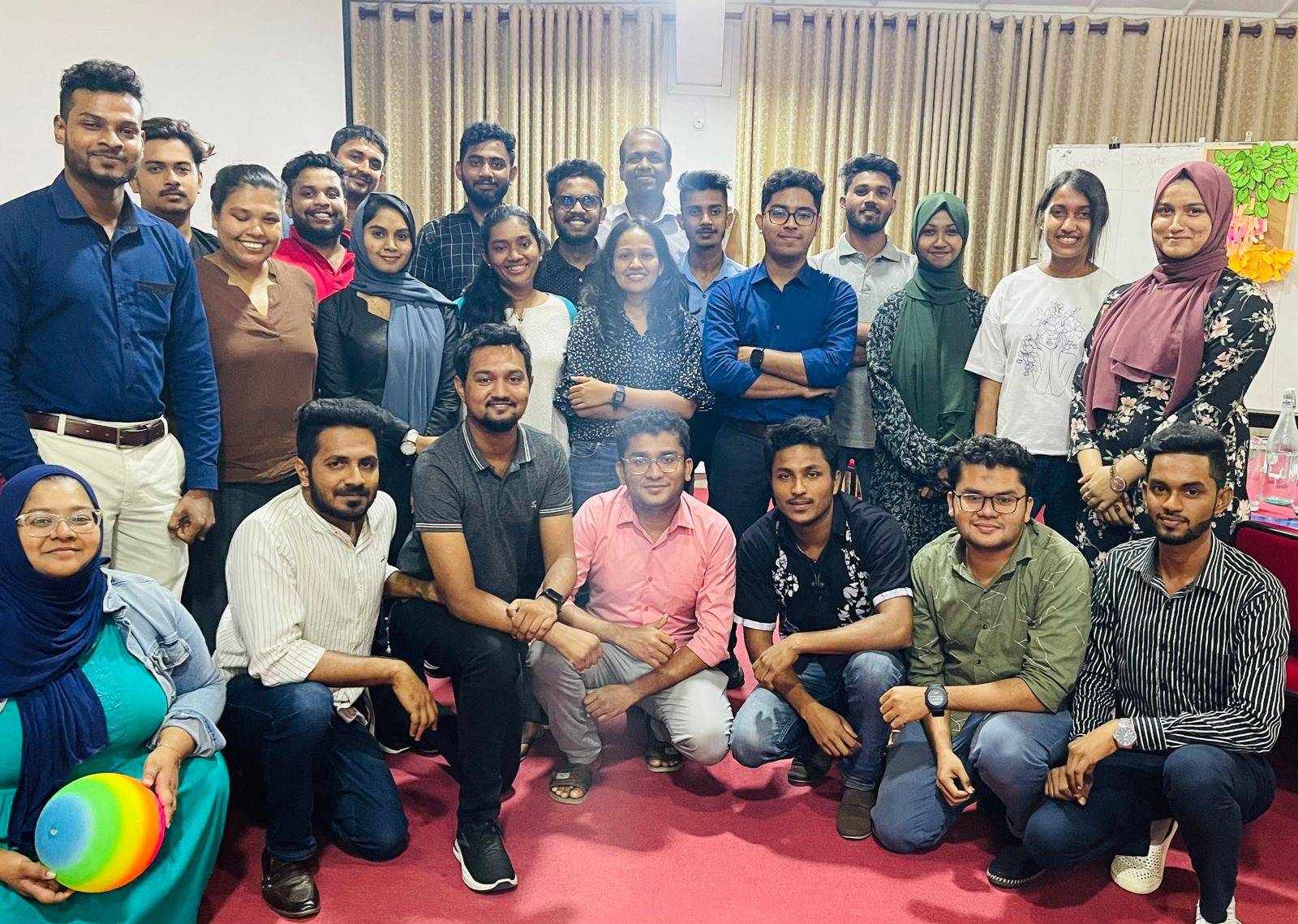
Youth Leadership for Climate Action (YLCA)
Biodiversity Sri Lanka (BSL) is carrying out an initiative called Youth Leadership for Climate Action (YLCA), targeting young people living in the Colombo district. The British Council is funding this program to develop young people into community leaders in climate action. The project includes a residential training program; either individually or in groups, the candidates must undertake a community intervention. BSL and CurveUp (Pvt) Ltd., are conducting the training sessions collaboratively.
Climate change is a significant issue for Sri Lanka and both human and natural systems could be impacted by its effects. In Sri Lanka, there are about 2.6 million young people, between the ages of 18 and 25 A quarter of the entire population would be considered young if the age range was expanded to include those between 15 and 29 years.
The British Council conducted a study in 2021 and discovered that while young people in Sri Lanka are generally aware of climate change, the majority lack a technical understanding and in-depth knowledge of the subject. The survey also found a lack of opportunities and platforms for youth to take initiatives and make decisions on climate change, as well as a lack of openness among state and non-state community stakeholders to up-take initiatives from young people.
As Sri Lankan youth showed a strong interest in learning more about climate change, the majority of them think that their thoughts and actions today will have an impact later on. This suggested that both governmental and non-governmental actors might engage with young people, enhance climate-related education and training, and offer them chances to take climate action.
In partnership with the British Council, BSL is giving a chance to Sri Lankan youth involved in local climate action (mitigation and adaptation) to expand their knowledge, expertise, and networks in order to provide better, more significant, and sustainable solutions to urgent social, economic, and environmental climate-related issues by involving local communities through the “Youth Leadership for Climate Action (YCA)” project.
YLCA project has its specific objective to enhance the knowledge and capabilities of youth for more effective and inclusive climate action through social mobilization.
The project will have four outcomes,
- Improved Knowledge, Skills and Connections of youth for community-level Climate action.
- Effective and Inclusive Climate Action Plans are developed and implemented by youth.
- Fellow youth are inspired and motivated towards favorable Climate action through shared experiences.
- Stakeholder support, collaboration, and recognition for youth Climate action.
This project is based in Colombo, and all youth community interventions are taking place in Colombo. Training for youth capacity-building is now being conducted, and the entire project will be completed by the end of March 2023.
Keep in touch with us for more updates on this fascinating program!
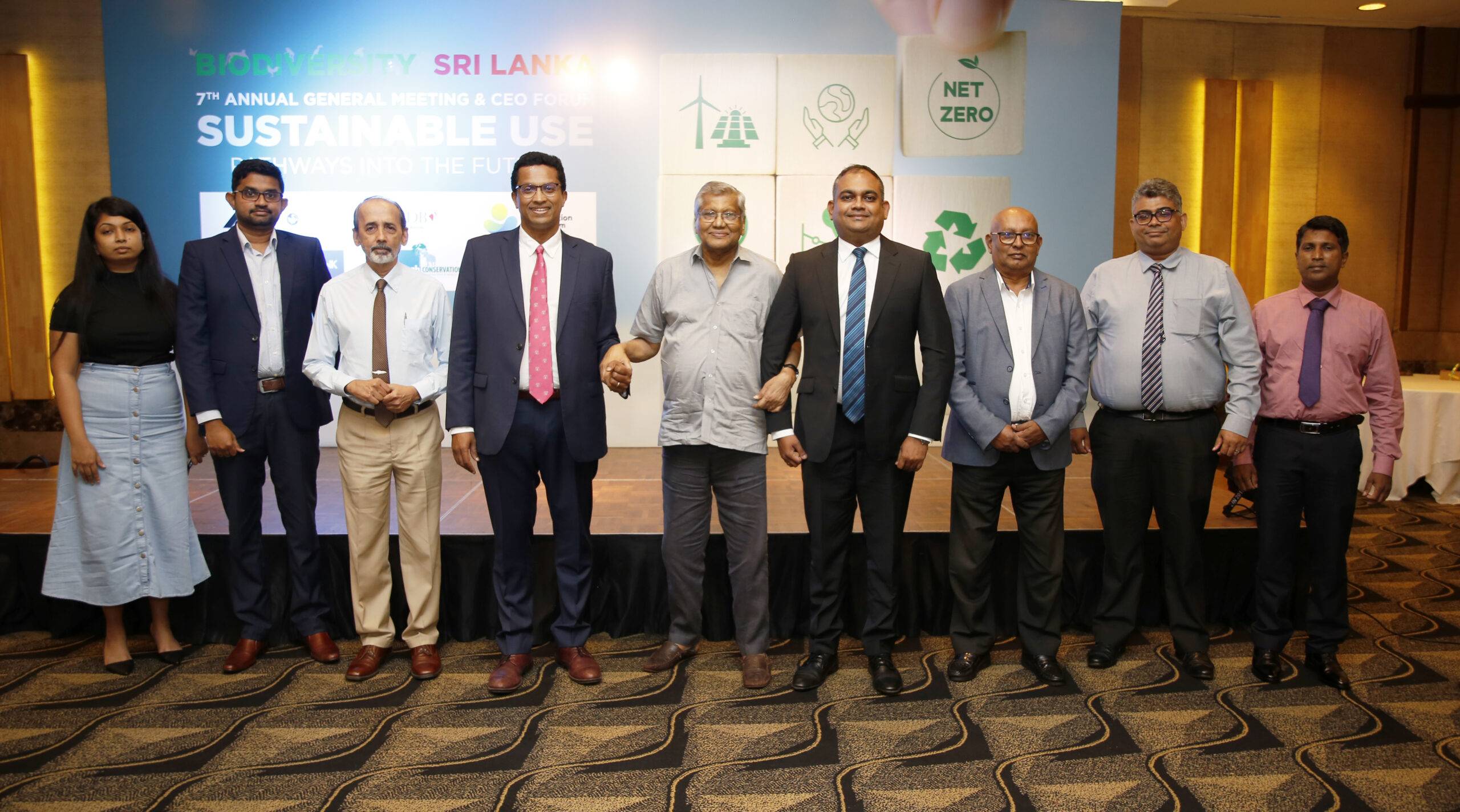
BSL holds its 7th Annual General Meeting
Biodiversity Sri Lanka held its 7th Annual General Meeting on November 3rd, 2022 at Ramada Colombo. The event was held physically after a two-year virtual hiatus due to the escalation of the COVID-19 pandemic.
At the meeting, a new Board of Directors was appointed. They are Mr. Dilhan C. Fernando, CEO of Dilmah Ceylon Tea Company and Trustee of Dilmah Conservation (Chair), Mr. Shiran Fernando, Chief Economist, Ceylon Chamber of Commerce, Mr. Anshuman Saikia, Coordinator, Regional Portfolio Management and Officer in Charge, IUCN Sri Lanka, Mr. Ranjith Pandithage, Chairman, DIMO, Mr. Hasrath Munasinghe, Deputy General Manager Marketing, Commercial Bank of Ceylon PLC, Ms. Sayuri Daluwatte, Group Chief Operations Officer, Jinasena (PVT) LTD. Mr. Lasitha Wimalaratne, Chief Executive Officer, HNB Assurance PLC. Mr. Prema Cooray, Chairman of Rainforest Ecolodge and a pioneer in the tourism and hospitality sector in the country, will continue to function as a Director/Chief Executive Officer. Dr. Rohan Pethiyagoda, Sri Lanka’s leading naturalist and taxonomist of freshwater fish of Sri Lanka was subsequently appointed as a Director being a person who has rendered outstanding service towards the fulfillment of the objects of the Association or who has proven expertise and/or standing in the field of business, sustainability and the environment in terms of Article 13.5 of the Articles of Association of BSL.
The Chairman, on behalf of the Secretariat, also took the opportunity to thank the outgoing members of the Board of Directors, including Mr. Nandana Ekanayake – Chairman of Siam City Cement (Lanka) Ltd., Mr. Mahesh Nanayakkara, Chief Executive Officer and Managing Director of Citizens’ Development Business Finance PLC., Mr. Shahid Mohomed Sangani, Director of Dynawash Ltd. and Mr. Subramaniam Eassuwaren – Deputy Chairman of Eswaran Brothers Exports (PVT) Ltd., for their outstanding service rendered towards the upliftment of the platform’s status, recognition, and effectiveness. Their services over the past two years have been of immense support and will no doubt be remembered and much appreciated over the years to come in this long journey we foresee.
Two of the past Directors who have served the platform diligently since its inception will no longer be with the board in the upcoming financial year. Dr. Ananda Mallawatantri retired from office as Country Representative of IUCN Sri Lanka in September 2022. He served on the Board, representing initiating partner IUCN from its inception. His untiring efforts towards the upliftment of BSL was recognized before the full membership of the Association.
Mr. Chandrarathne Vithanage, Senior Assistant Secretary General of the Ceylon Chamber of Commerce is also due to retire by the end of this year. He has been a strength from the inception of the Platform and has encouraged the staff in very many ways, giving them leadership in a number of initiatives that BSL has undertaken together with the CCC.
The former Secretary of the Ministry of Environment and present Secretary to the Prime Minister – Mr. Anura Dissanayake also left the board, in his capacity on the Board of Directors as a person who has rendered outstanding service towards the fulfillment of the objects of the Association with proven expertise and standing in the fields of business, sustainability and the environment. His current assignment as Secretary to the Prime Minister keeps him extremely busy in managing the country during these turbulent times and hence has requested that he be excluded from the Board of Directors for the next session.
The meeting was attended by a majority of BSL’s membership across all categories – Patron, General, SME and Associate. Sponsors of the event were American and Efird Lanka (Pvt.) Ltd., Citizens Development Business Finance PLC, Climate & Conservation Consortium, Commercial Bank of Ceylon PLC, Dilmah Conservation, and DIMO Lanka. Membership of BSL represents over 80 companies across 8 industry sectors, namely, agribusiness and food, banking and finance, engineering and construction, information and communications technology, manufacturing, service, tea plantations, and tourism and hospitality.
Established in August 2012, Biodiversity Sri Lanka was formally established as a not-for-profit company limited by guarantee on October 22, 2015, and has had a steady growth in membership up to date.
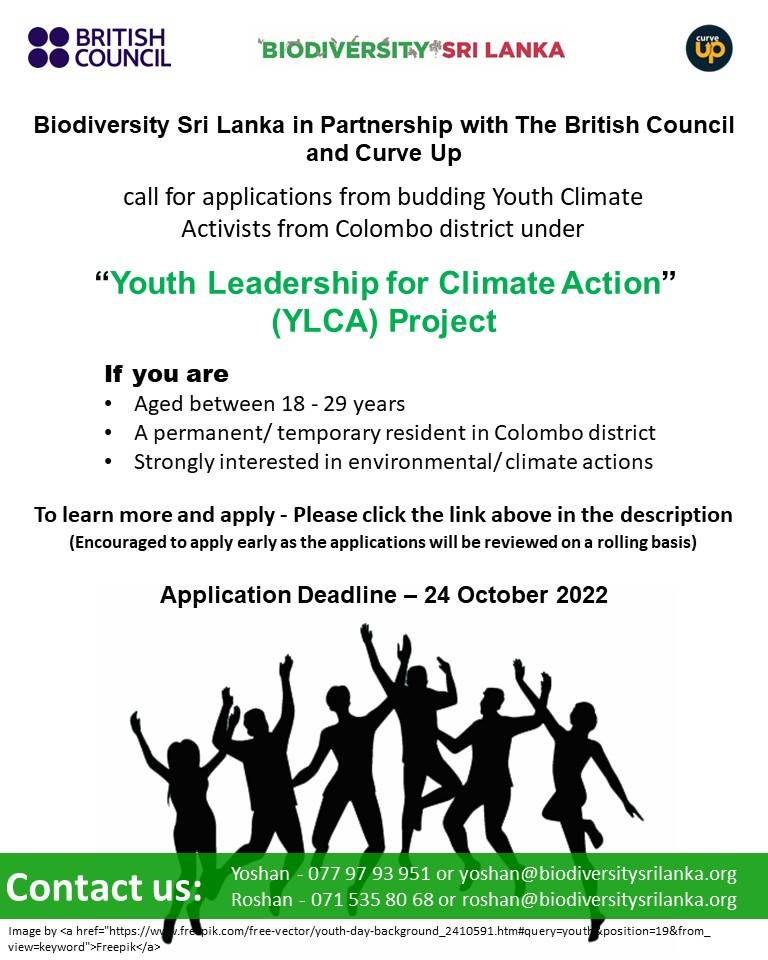
Call for applications from budding Youth Climate Activists from Colombo District under “Youth Leadership for Climate Action” (YLCA) Project
Biodiversity Sri Lanka in partnership with British Council and Curve Up
The Context
Biodiversity Sri Lanka is a national platform entirely owned and driven by the private sector established to promote strong engagement of the corporate sector in sustainable development. BSL’s overall mandate is to help raise awareness of biodiversity and sustainability issues amongst the Sri Lankan business community.
Curve Up is a pioneering education technology company in Sri Lanka. Curve Up works closely with several schools, global institutes, SMEs, and NGO communities to partner and develop solutions that are more innovative, adaptive, and effective.
The British Council has undertaken the Youth Leadership for Climate Action Project in Sri Lanka which intends to offer Sri Lankan youth active at community level climate action the opportunity to develop their knowledge, skills, and networks to offer better, more impactful, and sustainable solutions to pressing social, economic, and environmental climate-related issues through the engagement of local communities. Together, Biodiversity Sri Lanka and Curve Up carry out Colombo District’s project activities of the YLCA Project.
Opportunity for Youth
The project will run from October 2022 to March 2023, during which time the selected youth will undergo a series of intensive residential training programs on topics related to climate change, project management, and personality development. Upon completion of all the training sessions, youth are required to develop and implement a Community Action Project (individual or group) related to Climate Change within Colombo District in keeping with the project’s timeline.
Who may apply,
- Age between 18-29 years
- A permanent/ temporary resident of the Colombo district
- Available to take part in residential training (9 days of residential training in 3 segments) and subsequent community actions
- Strong interest and commitment for environmental/ climate action
- Should be able to carry out Community Intervention/ Action Project within Colombo District
- Ability to work effectively with people of diverse backgrounds, genders, ethnicities, and religions.
- Good communication skills in Sinhala or Tamil (English is not essential)
- Being a member of a community-based organization or a Youth Club is desirable
- This call is open and inclusive. All are encouraged to apply if you match the eligibility criteria given above etc.
To apply please visit the below link.
Sinhala: https://forms.gle/43E5BDEf7yQqDNcLA
English: https://forms.gle/YT92osUdb7Wmrgbe9
Tamil: https://forms.gle/hwUExaP7WArUL18eA
The applications will be reviewed on a rolling basis so we would recommend applying early. The deadline for submitting applications is 24 October 2022.
For any queries, please contact Yoshan at [email protected] or 0779793951 or Roshan at [email protected] or 0715358068
































